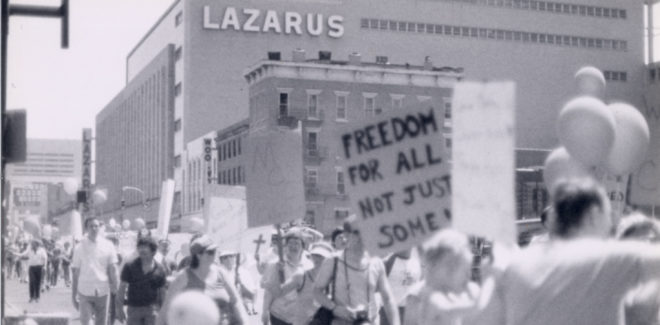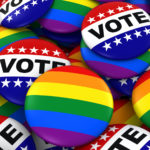
“Freedom For All Not Just Some” Stonewall Union Pride March circa 1980s.
Stonewall Union (now known as Stonewall Columbus) was incorporated by local Columbus, Ohio gay activists in 1981, in response to Jerry Falwell’s attempt to establish a Columbus based Moral Majority headquarters. The founding members established three primary goals for Stonewall Union: political lobbying and legislative reform, community building, and education.
Stonewall has been integral to the success of many pro-LGBTQ+ rights initiatives, including Governor Richard Celeste’s 1982 executive order protecting the hiring and promotion of gays and lesbians in state jobs; the 1988 Hobson AIDS Bill; and Columbus’ 1992 city ordinance prohibiting hiring discrimination based on sexual orientation.
In the early days Stonewall also published voters’ guides focusing on Gay, Lesbian, Bisexual, and Transgender (GLBT) issues, in terms of candidate endorsements as well as support for pro-gay rights ballot issues.
Flow Advocacy Items on our Blog: The CornerStone
Equality Act (United States)
The Equality Act is a bill in the United States Congress, that, if passed, would amend the Civil Rights Act of 1964 (including titles II, III, IV, VI, VII, and IX) to prohibit discrimination on the basis of sex, sexual orientation and gender identity in employment, housing, public accommodations, education, federally funded programs, credit, and jury service. The U.S. Supreme Court’s June 2020 ruling in Bostock v. Clayton County, Georgia protects gay/LGB and transgender people in matters of employment, but not in other respects.
Ohio LGBTQ+ Legislation
2024 LEGISLATIVE SESSION
The Buckeye Flame’s “2024 guide to Ohio’s LGBTQ+ legislation”
https://thebuckeyeflame.com/2024/01/27/2023-ohio-lgbtq-legislation-guide/
- HB 6 – The Save Women’s Sports Act (banning trans female athletes)
- HB 8 – The Parents’ Bill of Rights (forcing teachers/school staff to out LGBTQ+ youth)
- HB 68 – Save Adolescents From Experimentation Act (banning gender-affirming care)
- HB 113 – To Designate Detrans Awareness Day
- HB 183 – The Bathroom Bill
- HB 220 – Prohibit Certain Conversion Therapy for Minors
- HB 225 – To Designate June as Pride Month
- HB 240 – To Allow Public Schools to Employ Chaplains
- HB 245 – To Ban Drag Performances in Public Places
- HB 332 – The Marriage Equality Act
- SB 132 – The Ohio Fairness Act
| Voting Matters! |
Elections are important in helping to build safer and more affirming spaces in our communities.
LGBTQ+ adults in the United States voted at record rates in the 2020 election. However, this masks the reality that a substantial portion of LGBTQ+ adults have experienced barriers to voting in the past, including explicit forms of discrimination and voter suppression at the ballot box.





